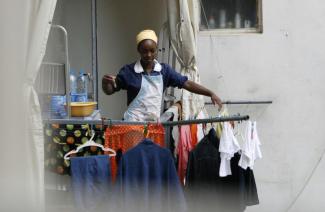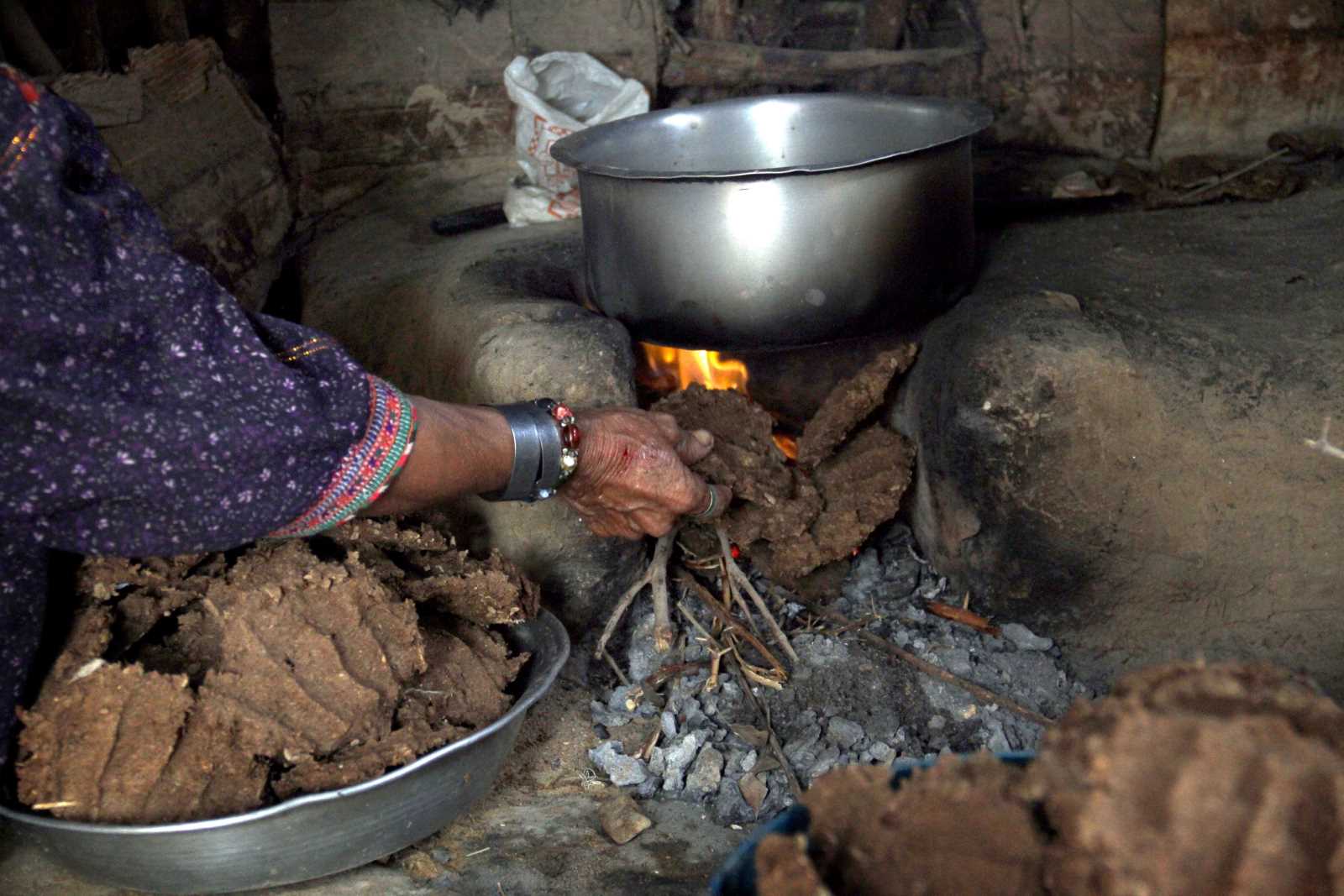Domestic workers
Working in lawless conditions

The largest groups are currently from Ethiopia and Bangladesh. Elssy Karaoghlanian of the Lebanese civil-society organisation Kafa (in Arabic: “enough!”) explains, workers from poor countries are in particular strong demand. The reason is that Lebanese employers tend to believe that women from poor backgrounds will be cheaper and more obedient. The average monthly wage for domestic workers from Bangladesh, Ethiopia and Nepal is the equivalent to $ 120. Domestic workers from Madagascar and the Philippines earn $ 250 to $ 300 per month.
Evelyne A. (name changed upon request) has been working in Lebanon for 19 years. She left her home in Madagascar in order to earn money and support her family. The average monthly wage in Madagascar is $ 125 dollars, and she could not find a job. Evelyne A. works in the suburbs of Beirut as a household helper. She cleans, washes, goes shopping and cooks. Even when the work is done, she still remains at the disposal of her employer: “I’m not allowed to rest; only at night, am I allowed to go to my room.” Her monthly wage of $ 400 is above average. Evelyne A. does not need to pay rent to her employer, but she does not have any pension scheme.
In spite of the hard working conditions, Evelyne A. considers herself lucky. She receives her wage on time, and she is not being abused – in contrast to many other women. According to a Kafa survey of domestic workers from Bangladesh and Nepal, 77 % work more than 14 hours per day, often without break. The majority is not allowed to leave the house of the employer; approximately half of them don’t receive their wage on time.
Deaths occur again and again. They are not investigated by the Lebanese authorities. Exact figures regarding the number of dead women are not available. Human Rights Watch, the international non-governmental organisation, assumes that a considerable share of these women died in attempts to flee from their employer, for instance, because they fell when trying to climb down from a balcony.
The employer has total power
The work of domestic workers in Lebanon is not covered by the labour law. The “kafala” system applies. It gives the employer full control. Kafala means “sponsor” in Arabic.
The employer applies for the residence permit and is therefore considered to be the person in charge by the Lebanese authorities. Employer and employee both sign a standard contract, which is predefined by the Lebanese Ministry of Labour. It includes, among other things, that a maid has the right to a clean, safe and healthy place to live, where she can rest and where she has privacy. She also has the right to one free day a week. But it is not defined how these rules are to be enforced. No minimum wage is specified. In disputes, authorities recommend to turn to the Ministry of Labour, but that is next to impossible for the women.
The domestic worker may only resign from the contract in the case of physical or sexual assaults, which have to be confirmed by a medical report. Failing payment of wages for three months are also a reason to resign. But for a domestic worker who does not speak Arabic and who often is restricted in her movements, any such incident is very difficult to prove.
Kafa activist Karaoghlanian describes the consequences of the kafala system: “The employer decides everything in the life of the domestic worker – what she eats, where she sleeps, everything. The power relations are clear: All power is with the employer. The weaker part has no idea of the laws in the country. She does not know where to go when there are problems.”
In 2015, domestic workers from different countries published open letters they wrote to Lebanese authorities. They described their vulnerable condition: “Even if we are being exploited and abused, we cannot leave our job. A domestic worker has only few options: either, she can be suffering silently and continue working, or she runs away. With the flight, she risks to be imprisoned and deported. In theory, she has a third option – to file a complaint with the governmental agencies. But she won’t use this last possibility, because she is aware of the bias of Lebanese authorities, and she knows the prejudices of society against herself.”
Legally legitimised exploitation
The exploitation of domestic workers starts with the recruitment process in their home countries. The women are not informed properly about their living and working conditions in Lebanon. They are not told about their only limited legal protection.
Some countries, including Ethiopia, the Philippines and Nepal, have recently banned recruitment for work in Lebanon. The reason is the lack of workers’ rights. A representative of the Nepalese community in Beirut said the ban makes sense in view of numerous “unresolved deaths of Nepalese women which were not investigated by the Lebanese police”.
However, neither the recruitment agencies nor official authorities in Lebanon respect the bans. In their eyes, the sanctions are not legally binding. More women will continue to come from the countries concerned to work as maids in Lebanon.
Fight for protection and rights
Some NGOs in Lebanon fight for the rights and the protection of domestic workers. Kafa, which fights gender-specific violence, has installed a hotline that is available day and night. Anybody can call there and report mistreatments, says Karaoghlanian: “Lebanese people call us when they observe that neighbours or relatives mistreat employees.” According to her, it is “very difficult for women, who are being abused by their employers, to come to us directly”. Karaoghlanian points out that more than 80 % of domestic workers have no contact to the outside world.
When Kafa is informed of abuse, the NGO contacts the local police, who then send a patrol: “Employee and employer are brought to the police station. We are also present, for instance during the interrogation. When the questioning is over, we escort the employee to our shelter.” Karaoghlanian can tell of physical violence, burns and fractured ribs. During the interrogation it often emerges, moreover, that the employees were not paid for months.
In recent years, the Lebanese state has begun to respond to the pressure of numerous NGOs. The Ministry of Labour has established a hotline, but since the women do not trust it, it is not being used.
In 2015, the domestic workers publicly announced the foundation of a trade union, the Domestic Workers Union in Lebanon. It is supported by the ILO (International Labour Organization) and by the local FENASOL (Federation Nationale des Syndicats des Ouvriers et Employes au Liban). However, the Lebanese Ministry of Labour does not acknowledge the union and even considers it illegal.
Evelyne A. and her colleague Rana B. (name changed upon request) are members of this union. Since it has no official status, the help that it offers has to go via FENASOL. Both activists demand of the Lebanese authorities that they acknowledge the union and abolish the kafala system. “We are adults. We came here to work, but we have no rights,” says Rana B.
The women also demand the ratification of the ILO convention No. 189: This convention sets international standards for domestic workers worldwide; it guarantees labour rights and legal rights. Rana B., who has been working in Lebanon for 20 years, says that for the first time, she hopes “that something will change for the better”. The sad truth, however, is that household workers’ rights are not enforced stringently in most countries, including highly developed ones.
Mona Naggar is a journalist and media trainer. She lives in Beirut, Lebanon.
mona.naggar@googlemail.com
Links
International Labour Organization’s (ILO) Convention No. 189 on Decent Work for Domestic Workers:
http://www.ilo.org/wcmsp5/groups/public/---asia/---ro-bangkok/documents/genericdocument/wcms_208561.pdf
Domestic Workers Union of Lebanon:
https://www.facebook.com/Domestic-Workers-Union-In-Lebanon-founding-Committee-553197294739276/














